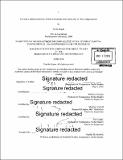Towards a better inclusivity : online comments and community at news organizations
Author(s)
Gupta, Anika
DownloadFull printable version (11.12Mb)
Alternative title
Online comments and community at news organizations
Other Contributors
Massachusetts Institute of Technology. Department of Comparative Media Studies.
Advisor
William Uricchio and Matthew Carroll.
Terms of use
Metadata
Show full item recordAbstract
Over the past several years, traditional - or legacy - news organizations have faced enormous challenges as a result of financial pressures and the advent of the participatory internet. This paper traces the znew journalistic contenders, new audience behaviors, and new business models that are emerging in participatory news spaces. This thesis situates the most visible form of online news participation - the comments section - within a broader and evolving debate over how news organizations create relationships with audiences. It draws upon existing literature and history as well as interviews with members of audience engagement and community management teams at news organizations, online comment communities, and comment-based startups. The first chapter of this thesis outlines "The Spectrum of Comments", a visual and text-based explanation of four key dimensions along which comments are organized in different online spaces ranging from social media to the New York Times. This section explores how news organizations balance the competing desire for audience participation with an impulse towards maintaining editorial control. The second chapter deals with the rise of "engagement," as both a commercial discourse and a new way to envision audience relationships. It begins by tracing the history of journalistic relationships to audiences, offering a taxonomy for these relationships based on mono logical and dialogical modes of conversation, as well as ritual and transmission views of communication. I introduce the term "multi-logical" to capture the asynchronous and multi-voiced communication that occurs in participatory online spaces. Through this theoretical framework, I then examine a few examples of how news organizations operationalize the nebulous term "engagement." The third chapter focuses on how audience engagement teams encounter and cope with abuse -- particularly bigotry and harassment - online, and compares moderation work to Hochschild's emotional labor. I find that abuse affects workers across the journalistic enterprise, and that one of the key focus areas for news organizations as they move forward with engagement should be to develop policies and internal guidelines for how to handle some of the risks of engagement.
Description
Thesis: S.M. in Comparative Media Studies, Massachusetts Institute of Technology, Department of Humanities, 2016. Cataloged from PDF version of thesis. Includes bibliographical references (pages 131-134).
Date issued
2016Department
Massachusetts Institute of Technology. Program in Comparative Media Studies/WritingPublisher
Massachusetts Institute of Technology
Keywords
Humanities., Comparative Media Studies.